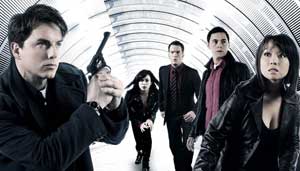Here we are again all set to talk about the fourth week of the Oprah Winfrey/Eckhart Tolle “A New Earth” Worldwide Web Event. Monday night’s class, based on Chapter 4 ‘Role-playing: The Many Faces of the Ego,’ is now available for viewing at Oprah.com (or watch it here at Beliefnet).
The topic of role-playing as it relates to the ego, or unconscious thought, is a huge one. Luckily, it’s one of the easiest to identify. I’ll start with a quick story from my own life.
I’ve lived in Los Angeles for over fifteen years and visit my family in Ohio at last once a year. For the longest time I couldn’t understand why my time spent there made me feel inauthentic to who I was the other 51 weeks of the year. It wasn’t that my family treated me like I was still in high school, or college even, it turned out it was my thoughts and my reactions that were on auto-pilot from the olden days.
I came to these conclusions years before reading any of Eckhart’s books, but this quote from “A New Earth” sums it up perfectly:
The more shared past there is in a relationship, the more present you need to be; otherwise, you will be forced to relive the past again and again. (p.101)
Once I realized that I, myself, was putting on an ill-fitted “SON” hat as soon as I stepped off the plane in the Buckeye State, I was freed from those behaviors that made me feel so different from the West Coast version of myself. I was reacting unconsciously in my life, allowing old conditioning and thought patterns to dictate my behavior.
This trap, for lack of a better word, is much like a mother who goes into depression when her child goes away to college or a man who doesn’t know who he is once he retires. (Forgive the gender-typing there, they’re interchangeable in my mind.) It’s ultimately no different than losing ourselves in a relationship when we are “in love” and lost in the role of Boyfriend/Girlfriend/Fiancé(e)/Newlywed/Wife/Husband, etc. These are all very commonplace and the first step to breaking the spell is awareness.
To be clear, as Eckhart and Oprah discussed Monday night, it’s not that playing any role is bad as we all fulfill them (and must) from time to time, it’s the getting lost in the role that can be damaging. In my own case, I was so completely lost in the role of the “Son” that I wasn’t able to just be present with my family.
The great thing is that once you see yourself caught in one role, that heightened level of consciousness makes it easy to see the roles you can get lost in, in most areas of your life.
“So who cares about getting lost in a role, Todd?”
It’s not that anyone cares— it’s that we aren’t connected to life when we’re living unconsciously. In the case of role-playing, we’re acting and reacting to preconceived thoughts we have about ourselves and others and that prevents us from the very experience of life, with ourselves and in our time with others. A great question to ask yourself, from the book, is if you treat the CEO of a company any differently than you treat the janitor of the same company. It says nothing about them and everything about us, of course.
Here are some other tidbits I thought were worth revisiting from Monday night’s class:
1) One of the most asked questions Oprah gets on the message boards and everywhere else is, “What if my peer/co-worker/spouse isn’t interested in all the things I’m discovering in this book and class?”
Response (and I’m paraphrasing everything in this part unless you see quotes): Don’t expect other people to change, too, just because you are seeing things you’ve never seen before in your own life. All you can do is take responsibility for your own state of consciousness. Otherwise, you’re working from a judgmental mind which is based in the unconscious ego wanting to feel superior/helpful/appreciated/etc. Also, don’t mistake their behavior of not being interested for who they are as we all share the same ground of being. Acceptance of everyone on their own path and in their own time is vital.
2) Oprah read the long paragraph below:
You are a human being. What does that mean? Mastery of life is not a question of control, but of finding a balance between human and Being. Mother, father, husband, wife, young, old, the roles you play, the functions you fulfill, whatever you do— all that belongs to the human dimension. It has its place and needs to be honored, but in itself it is not enough for a fulfilled, truly meaningful relationship or life. Human alone is never enough, no matter how hard you try or what you achieve. Then there is Being. It is found in the still, alert presence of Consciousness itself, the Consciousness that you are. Human is form. Being is formless. Human and Being are not separate but interwoven. (pp.104-105)
Here at the Idol Chatter blog, this speaks perfectly to our role. We blog about human form (celebrities/roles, movies, DVDs, TV, pop culture, etc.) ever watchful for the Being behind it all. Many would say that without God, life has only superficial meaning. It could easily be argued that Eckhart is saying the same thing when he wrote that paragraph above.
In any event, it’s a wonderful way to think about yourself and everyone else, as part human and part Being. Physical and spiritual. To be in the world but not of it.
3) Eckhart gave a metaphor of a lake for viewing Presence in yourself.
The surface of a lake is ever-changing due to rain and wind and what-have-you. These are the external circumstances in your life. However, your very presence, your Being, is like the undisturbed bottom of the same lake. He calls it true freedom when you realize this for there will always be a sense of peace and stillness within you when you are connected to the bottom of the lake and not equating yourself with all the surface disturbances.
4) As for catching yourself in role-playing, you may first notice it only in hindsight.
“Why did I let my boss get to me so much a few minutes ago? Why was I so thrown off by that telephone call? Why do I let my children push my buttons so much?”
Many times the awareness first starts only in retrospective like this.
Then it might hit you in the middle of a situation where you get a glimpse of yourself wearing a particular hat and feeling the need to defend that…hat…as if it were you.
Finally, the awareness starts to come in just before you’re about to play that tried and true role yet again. Then when you recognize the beginning impulse, the choice is yours whether to play it or to move forward in the moment, operating from the bottom of the lake, as it were.
5) Here’s a great exercise I will try to incorporate into my daily routine:
When the phone rings, don’t pick it up right away. Let it ring a couple of times more than normal and allow yourself to be present in the moment before picking it up. See if that makes a difference in how you handle the call.
Of course, two rings gets the Caller ID to show up on my phone…which will often set the mood for the call before I even pick it up! I could use this trick sometimes.
6) Eckhart said this and I think it got lost in the shuffle of the class, but I find it to be true and think it bears repeating:
One conscious breath in and out is a meditation.
7) For extra credit and a bit of a brain twister, watch the video to see why Eckhart says that life is the dancer and you are the dance. Oprah echoed many people’s sentiments when she said she thought it was just the opposite. I’m honestly still trying to understand this one.
He also says in this same segment that most of us think we have come into the universe when we have really come out of the universe. We are the universe experiencing itself. Good, good stuff to get your synapses firing!
Again, this is only scratching the surface of the chapter, one of his longest in the book from the way Mademoiselle Oprah was acting. For explanations of these topics and to see why it’s important to protect our children but also allow them to experience suffering and why Eckhart has no fear of death (which I also completely understand) check out the video at Oprah.com or here at Beliefnet.
See you next week for comments on Chapter 5, “The Pain-Body,” a concept I’ve heard of from his other writings, but one with which I’m honestly not that familiar. I assume it has nothing to do with how my legs felt after a recent ten-mile hike. Until next week!


